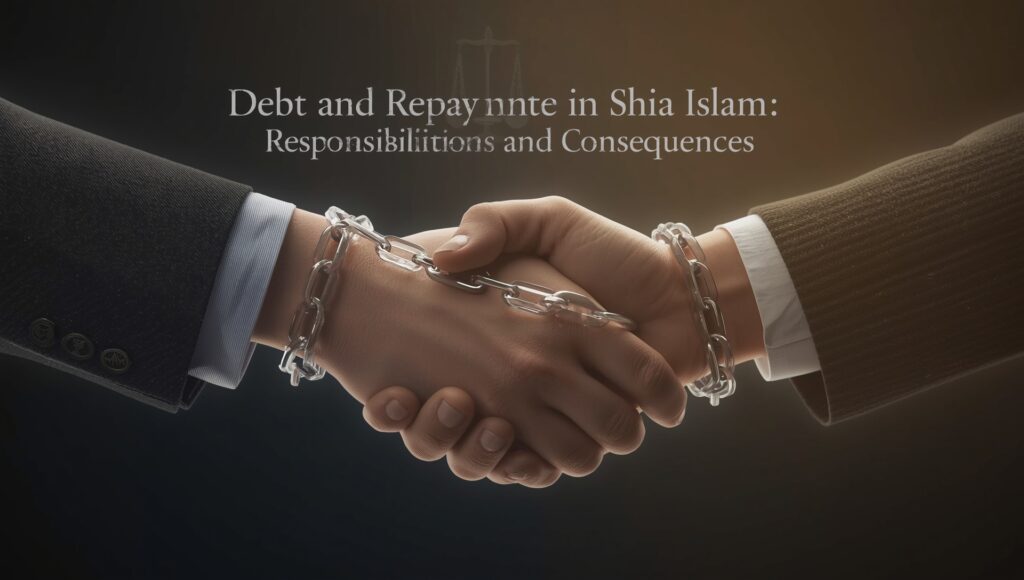- Introduction: The Weight of a Financial Obligation
- The Islamic View on Debt: A Necessary Evil
- The Sacred Responsibility of the Borrower
- The Intention: Borrowing for a Righteous Need
- The Promise: A Covenant That Must Be Honored
- The Effort: Actively Working Towards Repayment
- The Ethical Duties of the Lender
- Lending with Good Intentions
- Flexibility and Compassion for Those in Hardship
- The Spiritual Consequences of Unfulfilled Debt
- Debt as a Barrier in the Afterlife
- The Impact on Daily Worship and Peace of Mind
- Seeking Resolution: What If You Can’t Repay?
- Communicating with the Lender
- The Islamic Concept of Bankruptcy and Debt Forgiveness
- Practical Steps for Managing and Avoiding Debt
- Guidance from Shia Marjas: The Fiqh of Debt
- The View of Ayatollah Ali al-Sistani
- The View of Ayatollah Ali Khamenei
- Conclusion: Freedom from Debt, Freedom for the Soul
- Frequently Asked Questions (FAQ)
- References and Further Reading
Introduction: The Weight of a Financial Obligation
In the modern world, debt is often seen as a simple financial tool—a means to an end for buying a home, pursuing education, or starting a business. However, in Shia Islam, the concept of debt (dayn) carries a profound spiritual and ethical weight that transcends its monetary value. It is not merely a transaction but a sacred trust (amanah) and a solemn covenant that impacts one’s relationship with both the creator and fellow human beings. The responsibilities of debt repayment in Islam are taken with utmost seriousness, with warnings from the Ahlul Bayt (AS) about its consequences in this life and the hereafter. This article delves into the Islamic ethics of borrowing and lending, outlining the duties of both parties, the severe spiritual repercussions of negligence, and the path to seeking resolution and financial freedom in accordance with the teachings of Shia Islam.
The Islamic View on Debt: A Necessary Evil
Islam does not prohibit debt outright. Recognizing that individuals may face genuine needs and emergencies, it permits borrowing as a necessary facility. The Quran and Sunnah even encourage helping others through benevolent loans. However, it is consistently framed as something to be avoided if possible.
A famous tradition from the Holy Prophet (PBUH) states: “Avoid debt, for debt is a concern by night and a humiliation by day.” Another hadith warns, “The soul of a believer is held hostage by his debt until it is paid for him.”
These traditions highlight the Islamic perspective: debt is a burden that creates anxiety, stress, and a sense of subjugation. It is a “necessary evil” to be resorted to only when truly needed, and to be discharged at the earliest possible opportunity.
The Sacred Responsibility of the Borrower
When a Muslim takes on debt, they enter into a contract with heavy responsibilities.
The Intention: Borrowing for a Righteous Need
The permissibility of debt is closely tied to the intention behind it. Borrowing for a essential, lawful (halal) need—such as medical treatment, basic shelter, education that leads to earning a halal livelihood, or to resolve a existing debt—is viewed differently than borrowing for extravagance, luxury, or to finance a sinful activity.
The Promise: A Covenant That Must Be Honored
The loan agreement is a covenant (ahd). Honoring one’s covenants is a fundamental Islamic principle. Allah (SWT) says in the Quran: “O you who have believed, fulfill [all] contracts…” (Surah Al-Ma’idah, 5:1). Repaying debt is thus not just a financial duty but an act of worship and a testament to one’s faith and honesty.
The Effort: Actively Working Towards Repayment
A believer is obligated to be proactive in repayment. This means managing finances responsibly, avoiding unnecessary expenses, and diligently working to generate the income required to settle the debt. It is a sin to have the means to pay but willfully delay or avoid repayment.
The Ethical Duties of the Lender
The responsibility does not lie with the borrower alone. The lender also has ethical duties:
Lending with Good Intentions
A loan should be given with the pure intention of helping a fellow Muslim in need, seeking the pleasure of Allah (SWT). It should not be given to show off, to gain power over someone, or with a hidden hope that they will fail to repay so you can take advantage of them.
Flexibility and Compassion for Those in Hardship
If a borrower is genuinely unable to repay, the lender is strongly encouraged to be compassionate and patient. The Quran beautifully exhorts: “And if someone is in hardship, then [let there be] postponement until [a time of] ease. But if you give [from your right as] charity, then it is better for you, if you only knew.” (Surah Al-Baqarah, 2:280). Granting extra time or even forgiving the debt as an act of charity is considered a highly virtuous act.
The Spiritual Consequences of Unfulfilled Debt
The consequences of unpaid debt are severe in Islamic theology.
Debt as a Barrier in the Afterlife
It is believed that the soul of a person who dies while owing debt and having the means to pay it back may be held accountable and unable to attain complete peace. While martyrdom forgives all sins, traditions state that even a martyr is not forgiven their debt—it must be settled from their estate. This shows the gravity of the rights of other people (huquq al-nas), which Allah does not forgive unless the wronged party forgives them first.
The Impact on Daily Worship and Peace of Mind
Unresolved debt can become a spiritual distraction. It can weigh on one’s conscience, diminish the concentration in prayer (salah), and create a constant state of worry that contradicts the peace and trust in Allah that faith is meant to provide.
Seeking Resolution: What If You Can’t Repay?
Communicating with the Lender
The first step for someone struggling to repay is to openly and honestly communicate with the lender. Explaining the situation and seeking an extension is far better than hiding or avoiding them. This honesty is part of one’s religious duty.
The Islamic Concept of Bankruptcy and Debt Forgiveness
If a person is truly bankrupt and has no assets, Islamic law provides protections. After a verified assessment of their inability to pay, they can be granted relief. The lender is urged to forgive the debt or accept a delayed payment plan.
Practical Steps for Managing and Avoiding Debt
- Budgeting and Living Within Means: The primary defense against debt is a disciplined financial life.
- Building an Emergency Fund: Saving even a small amount regularly can prevent the need for loans in emergencies.
- Exploring Halal Alternatives: Before taking a loan, explore other options like family support, profit-loss sharing partnerships, or selling unused assets.
- Prioritizing Repayment: Treat debt repayment as a non-negotiable expense in your budget.
Guidance from Shia Marjas: The Fiqh of Debt
The View of Ayatollah Ali al-Sistani
Ayatollah Sistani emphasizes the obligatory nature of repaying debt. If a debtor has the means, repayment is wajib (obligatory). He states that if a person dies with debt, the debt must be paid from their estate before any inheritance is distributed. He also highlights that taking a loan for a non-essential purpose is disliked (makruh).
The View of Ayatollah Ali Khamenei
Ayatollah Khamenei’s rulings align closely, stressing that fulfilling financial obligations is a serious Islamic duty. He also notes that if a debt contract included interest (riba), the borrower is only obligated to repay the principal amount, not the interest, as the interest portion of the contract is null and void.
Conclusion: Freedom from Debt, Freedom for the Soul
In Shia Islam, debt is a serious commitment that binds the soul. While permissible in times of need, it is a burden to be shouldered with sincere intention, a firm plan for repayment, and a deep understanding of the rights of the lender. The path to financial and spiritual well-being lies in minimizing debt, fulfilling obligations with urgency and honesty, and treating the financial struggles of others with compassion and flexibility. By upholding these principles, a believer can seek not only financial freedom but also the peace of mind and spiritual purity that comes from honoring the trust placed in them by their fellow human beings and, ultimately, by Allah (SWT).
Frequently Asked Questions (FAQ)
Q1: What if the lender has passed away? How do I repay the debt?
A: The debt remains valid. You should locate the lender’s heirs (children, spouse, etc.) and repay the debt to them. If you cannot find them, you should give the amount as charity (sadaqah) on their behalf with the intention that the reward reaches them.
Q2: Is it necessary to have a written contract for a loan?
A: While an oral agreement is binding, Islamic teachings strongly recommend writing down the terms of the debt, including the amount, the parties involved, and the expected repayment date, to avoid future disputes or forgetfulness. This is based on the Quranic verse in Surah Al-Baqarah (2:282).
Q3: Can I give a loan and charge a fee for administration?
A: No, charging any predetermined extra amount on a loan is considered riba and is haram. The lender can only get back the exact principal amount they lent. However, if the borrower voluntarily gives a gift (hibah) after repayment as a token of thanks, that is permissible.
Q4: Does charity have more virtue than giving a loan?
A: While both are virtuous, a benevolent loan (qard al-hasanah) is considered highly noble. Allah says in the Quran: “Who is it that would loan Allah a goodly loan so He may multiply it for him many times over?” (2:245). It is a help that maintains the dignity of the recipient.
Q5: What should I do if I borrowed money for a haram purpose?
A: You must still repay the principal amount of the debt to clear the financial right of the lender. However, you must also sincerely repent (tawbah) to Allah for using the money for a forbidden purpose.
References and Further Reading
- The Official Website of the Office of Ayatollah al-Udhma Ali al-Sistani: www.sistani.org – Search for “debt” and “loan”.
- The Official Website of the Office of the Supreme Leader Sayyid Ali Khamenei: www.leader.ir
- Nahj al-Balagha (Peak of Eloquence) – Sermons and Letters of Imam Ali (AS): Contains numerous exhortations about debt and financial responsibility.
- A Code of Practice For Muslims in the West by Ayatollah Sistani – Contains sections on financial transactions and debts.
- Tawzih al-Masa’il (Practical Laws of Islam) by various Marjas – The chapters on Loans and Debts.

